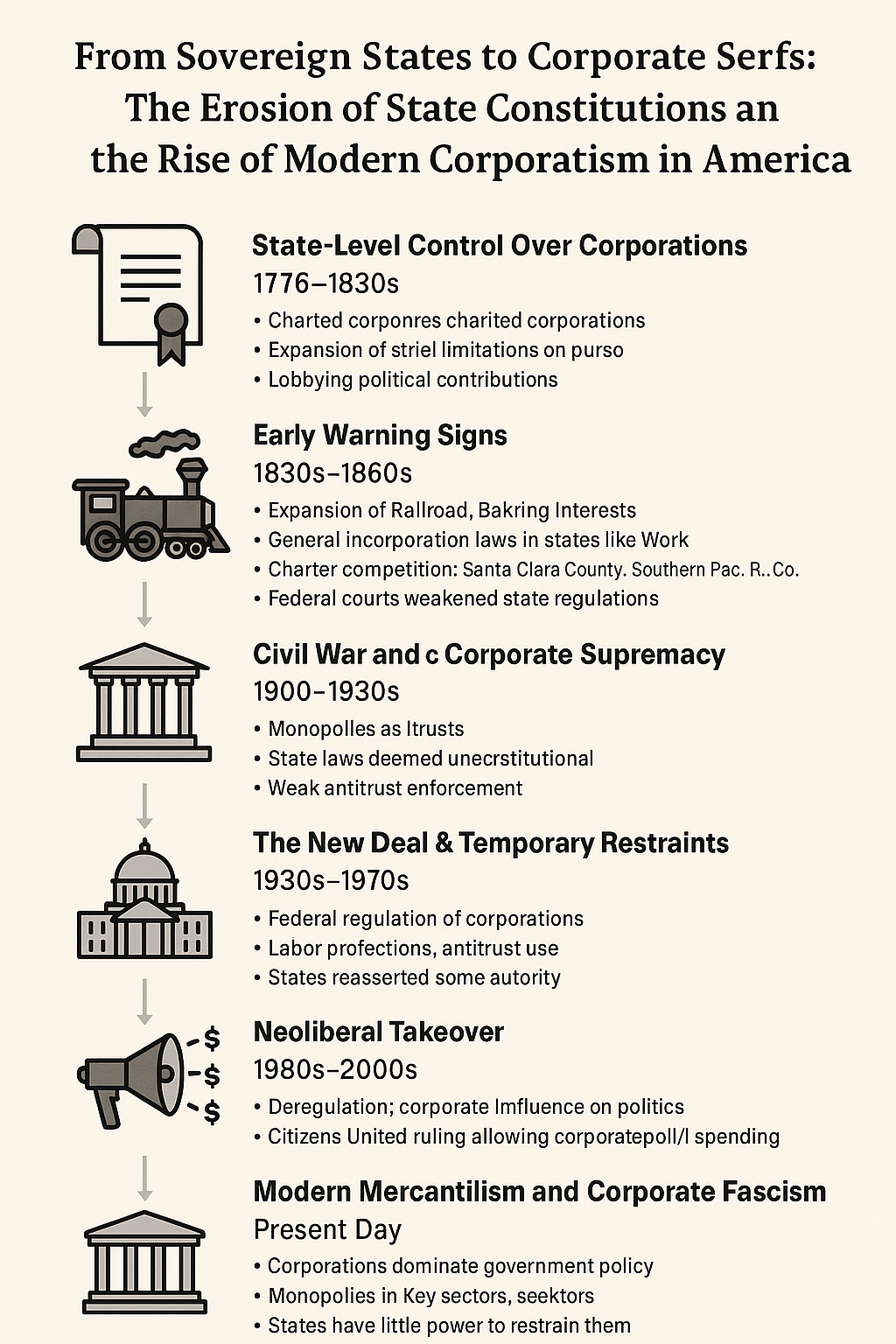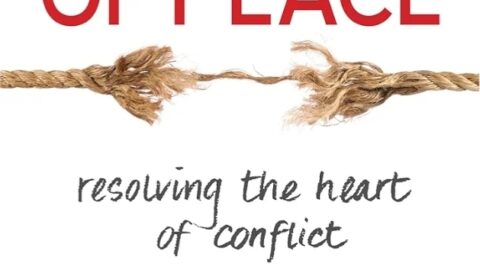Introduction: The Original Safeguards Against Corporate Tyranny
When the United States was founded, the Founding Fathers and state legislators harbored deep suspicion of corporations. Having recently broken away from the British Crown, where monopolistic entities like the British East India Company had acted as extensions of imperial power, early American leaders intentionally restricted corporations under state constitutions, chartering them narrowly and for limited public purposes (such as building canals or bridges).
The U.S. Constitution does not mention corporations, not because it was an oversight, but because regulation of such powerful entities was considered the domain of the states. This intentional design served as a bulwark against economic tyranny. However, over time, this protection was dismantled piece by piece through judicial rulings, lobbying, legislative corruption, and public ignorance—ushering in a new era of corporate dominance, or what can rightly be called modern mercantilism or economic fascism.
I. Foundations: State-Level Control Over Corporations (1776–1830s)
In the post-Revolutionary period, the American states jealously guarded their sovereignty and feared the rise of powerful economic actors. State constitutions and charters were crafted to ensure:
- Corporations were created only by direct legislative approval.
- Charters had expiration dates (typically 10–20 years).
- Corporations could only act within their specified purpose.
- Shareholders were personally liable in some cases.
- Corporations could not own other corporations, preventing conglomerate power.
- Political contributions or lobbying were strictly prohibited.
“Corporations have neither bodies to be punished nor souls to be damned.” – Edward, First Baron Thurlow
This model protected local economies, communities, and democratic governance from being hijacked by monopolistic or absentee powers.
II. Early Warning Signs: The Rise of Corporate Privilege (1830s–1860s)
As America industrialized, powerful business interests began pushing back against state-level restrictions:
- Railroad and banking interests lobbied state legislatures for broader charters.
- States like New York and Pennsylvania began passing general incorporation laws, removing the requirement for legislative approval.
- States began competing to attract corporate business, watering down restrictions.
Jacksonian Democrats warned of a rising “money power” that threatened the republic. However, the industrial revolution created massive economic momentum and the public began tolerating corporate expansion—seeing it as the engine of progress.
III. Civil War and Corporate Personhood: The Constitutional Peril (1860s–1900)
The aftermath of the Civil War accelerated industrialization and centralized federal power—but it also marked a turning point in corporate rights:
- 1868: The 14th Amendment was passed to protect formerly enslaved people—but it was co-opted by corporations, who claimed equal protection under the law.
- 1886: Santa Clara County v. Southern Pacific Railroad – The U.S. Supreme Court recognized corporations as “persons” under the 14th Amendment, even though the decision’s headnote, not the ruling, implied this. Nevertheless, it became precedent.
- States began losing control over charter limitations as federal courts overturned restrictions under constitutional grounds.
This marked the subversion of state constitutional authority and the beginning of corporate constitutional rights—a legal fiction that would snowball for decades.
IV. The Gilded Age and Corporate Supremacy (1900–1930s)
This era saw:
- The formation of trusts and monopolies (e.g., Standard Oil, U.S. Steel).
- State laws restricting business were challenged as unconstitutional under “due process” and “equal protection.”
- Courts ruled that states could not interfere with interstate commerce, reducing their ability to restrain corporations headquartered elsewhere.
- Antitrust laws, while symbolically strong (like the Sherman Act), were poorly enforced and often used against labor unions, not corporations.
The Supreme Court sided overwhelmingly with corporate interests during this period, undermining populist and progressive attempts to return to state-centered accountability.
V. The New Deal & Temporary Restraints (1930s–1970s)
Franklin D. Roosevelt’s New Deal briefly shifted the balance:
- Federal regulations (like the Securities Exchange Act, Glass-Steagall, Wagner Act) restrained corporate abuses.
- Labor protections, antitrust enforcement, and social safety nets created a more balanced economy.
- Some states reasserted environmental and labor standards.
But this era was an anomaly, not a reversal. The corporate elite regrouped through think tanks, law firms, and lobbyists. By the 1970s, with economic stagnation and global competition rising, they began reclaiming dominance—this time more sophisticated and coordinated.
VI. The Neoliberal Takeover: Rewriting the Social Contract (1980s–2000s)
- 1971: Lewis Powell Memo – A confidential document urging corporations to aggressively shape law, education, media, and politics. Powell would soon become a Supreme Court Justice.
- 1980s–90s: Deregulation of banking, telecom, and energy under Reagan, Clinton, and others.
- Citizens United v. FEC (2010): The Supreme Court ruled that corporations have free speech rights, allowing unlimited political spending.
- States that tried to regulate campaign finance or corporate behavior were overruled under constitutional grounds.
State constitutions, once the guardian of public welfare, were now trumped by federal courts, and corporate rights superseded those of real people.
VII. Present Day: Modern Mercantilism and Corporate Fascism
We now live in a hybrid system resembling mercantilism and fascism:
- Corporations dictate policy, fund politicians, and control media narratives.
- Government defers to corporate interests (Big Pharma, Big Tech, Wall Street).
- Monopolies dominate every sector, from food and finance to data and defense.
- States have little power to restrain them due to federal preemption and constitutional reinterpretation.
“Fascism should more properly be called corporatism, since it is the merger of state and corporate power.” – Attributed to Benito Mussolini
VIII. The Price of Public Ignorance
The gradual erosion of state power over corporations was possible only because Americans were not educated on their constitutional heritage:
- Civics was replaced with superficial instruction.
- Corporate media reframed public understanding of freedom and rights.
- Universities, often funded by corporate donors, abandoned classical education for compliant professionalism.
The result: a population untrained in the principles of liberty, unaware that the original checks and balances were not just political, but economic—designed to keep corporate power subordinate to the people.
Conclusion: Can the Republic Be Restored?
The Founders understood that unrestrained private power could be as dangerous as tyrannical government. Their solution was distributed sovereignty, strong state constitutions, and public virtue.
We now face a critical choice:
- Continue in ignorance and dependence, accepting corporate governance disguised as democracy.
- Or revive the original American principles, educate ourselves, and restore local sovereignty through both political reform and economic decentralization.
“Eternal vigilance is the price of liberty.” – Thomas Jefferson
The erosion of state constitutions is not just a legal tragedy—it is a spiritual and cultural collapse. Only through repentance, education, and courageous action can the people reclaim their power.







